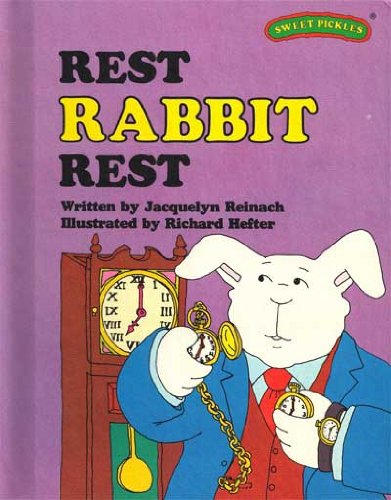-
Rabbit at Rest
John Updike
Paperback (Random House Trade Paperbacks, Aug. 27, 1996)Winner of the Pulitzer Prize, the Howells Medal, and the National Book Critics Circle Award In John Updike’s fourth and final novel about Harry “Rabbit” Angstrom, the hero has acquired a Florida condo, a second grandchild, and a troubled, overworked heart. His son, Nelson, is behaving erratically; his daughter-in-law, Pru, is sending him mixed signals; and his wife, Janice, decides in midlife to return to the world of work. As, through the year of 1989, Reagan’s debt-ridden, AIDS-plagued America yields to that of the first George Bush, Rabbit explores the bleak terrain of late middle age, looking for reasons to live and opportunities to make peace with a remorselessly accumulating past.
-
Rabbit at Rest
John Updike, William Hope, Audible Studios
Audible Audiobook (Audible Studios, Aug. 20, 2015)It's 1989, and Harry "Rabbit" Angstrom is far from restful. Harry is 56 and overweight, and he has a struggling business on his hands and a heart that is starting to fail. His family, too, are giving him cause for concern. His son, Nelson, is a wreck of a man, a cocaine addict with shattered self-respect. Janice, his wife, has decided that she wants to be a working girl. And as for Pru, his daughter-in-law, she seems to be sending out signals to Rabbit that he knows he should ignore but somehow can't. He has to make the most of life, after all. He doesn't have much time left.... John Updike was born in 1932 in Shillington, Pennsylvania. He attended Shillington High School, Harvard College and the Ruskin School of Drawing and Fine Art at Oxford, where he spent a year on a Knox Fellowship. From 1955 to 1957 he was a member of the staff of The New Yorker, to which he contributed numerous poems, short stories, essays and book reviews. After 1957 he lived in Massachusetts until his death. John Updike's first novel, The Poorhouse Fair, was published in 1959. It was followed by Rabbit, Run, the first volume of what have become known as the Rabbit books. Rabbit Is Rich (1981) and Rabbit at Rest (1990) were awarded the Pulitzer Prize for Fiction.
-
Rabbit at Rest
John Updike
eBook (Random House, July 23, 2010)Winner of the Pulitzer Prize, the Howells Medal, and the National Book Critics Circle Award In John Updike’s fourth and final novel about Harry “Rabbit” Angstrom, the hero has acquired a Florida condo, a second grandchild, and a troubled, overworked heart. His son, Nelson, is behaving erratically; his daughter-in-law, Pru, is sending him mixed signals; and his wife, Janice, decides in midlife to return to the world of work. As, through the year of 1989, Reagan’s debt-ridden, AIDS-plagued America yields to that of the first George Bush, Rabbit explores the bleak terrain of late middle age, looking for reasons to live and opportunities to make peace with a remorselessly accumulating past.
-
Rabbit at Rest
John Updike, Justin Cartwright
eBook (Penguin, June 1, 2006)It's 1989, and Harry 'Rabbit' Angstrom is far from restful. Fifty-six and overweight, he has a struggling business on his hands and a heart that is starting to fail. His family, too, are giving him cause for concern. His son Nelson is a wreck of a man, a cocaine addict with shattered self-respect. Janice, his wife, has decided that she wants to be a working girl. And as for Pru, his daughter-in-law, she seems to be sending out signals to Rabbit that he knows he should ignore, but somehow can't. He has to make the most of life, after all. He doesn't have much time left ...
-
Rabbit At Rest
John Updike
Hardcover (Alfred A. Knopf, Sept. 26, 1990)In John Updike's fourth and final novel about ex-basketball player Harry "Rabbit" Angstrom, the hero has acquired heart trouble, a Florida condo, and a second grandchild. His son, Nelson, is behaving erratically; his daughter-in-law, Pru, is sending out mixed signals; and his wife, Janice, decides in midlife to become a working girl. As, through the winter, spring, and summer of 1989, Reagan's debt-ridden, AIDS-plagued America yields to that of George Bush, Rabbit explores the bleak terrain of late middle age, looking for reasons to live. The geographical locale is divided between Brewer, in southestern Pennyslvania, and Deleon, in southwestern Florida. Y
Y
-
Rest, Rabbit, Rest
Jacquelyn Reinach, Richard Hefter
Hardcover (Henry Holt & Co, March 1, 1978)Rabbit's schedule keeps him so busy his friends have to trick him into resting. J
J
-
Rabbit at Rest
John Updike
Mass Market Paperback (Fawcett, Aug. 31, 1991)Winner of the 1991 Pulitzer Prize for Fiction.In John Updike's fourth and final novel about ex-basketball player Harry "Rabbit" Angstrom, the hero has acquired heart trouble, a Florida condo, and a second grandchild. His son and daughter-in-law are acting erratically, his wife Janice wants to work, and Rabbit is searching his soul, looking for reasons to live...."Brilliant...It must be read."THE WASHINGTON POST BOOK WORLD
-
Rabbit at Rest.
John Hoyer(1932-2009) Updike
Paperback (Fawcett Crest/Ballantine, March 15, 1991)None
-
Rabbit at Rest
John Updike, Cary Henrie
Leather Bound (Franklin Library First Edition Society, Jan. 1, 1990)Rabbit is Rich is the closing chapter and is really about Harry Rabbit Angstrom coming to terms with his morality and reflecting on his life
-
Rabbit at Rest
John Updike
Paperback (Gardners Books, Oct. 31, 1991)None
-
Rabbit at Rest
John Updike
Paperback (Penguin Books, Limited (UK), May 1, 2010)Hard to find
-
Rabbit at Rest
John Updike
Audio Cassette (Random House Audio, Oct. 24, 1990)2 cassettes / 3 hoursRead by the AuthorJohn Updike, a genius at creating uncannily vivid mirror images of American life, is at his best in this final episode of the extraordinary "Rabbit" saga.Here is a last look at a character followed by millions through four decades of his existence - a story that reflects the complexities of contemporary experience , told by the Pulitzer prize winning master of modern fiction.